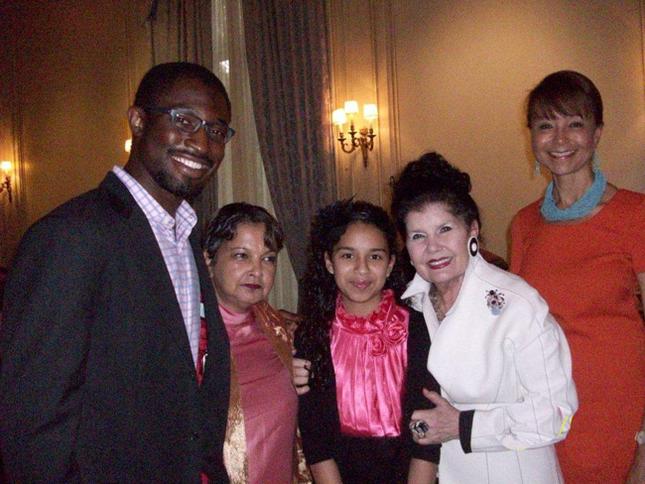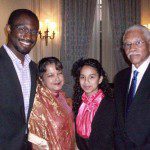Mockingbird
By • June 7, 2012 0 2444

Washington is one of the social, fraternal cities in the world, it’s a town that’s full of associations, organizations, societies, orders, and institutions, networking across the city, holding meetings, honoring group efforts and individuals, good people all gathering together to make some differences here and there.
It is a kind of subterranean culture, a world whose citizens are continually active, but whose activities often go little noted in the larger world of the whole city. Yet, those meetings, those events and celebrations contain worlds of concern, feelings and talk and expressions and plans about things that matter to each and every one of us.
And so it was that you saw representatives of groups such as The Humanities Council of Washington DC, the DC Commission on the Arts & Humanities, attorneys, ambassadors, former diplomats, educators and an assortment of co-conspirators in the quest to come together on missions that raise awareness, that enrich the culture, that act as agents for changes and improvement in the community and world at large all gathered together at the Meridian International Center, whose title speaks for itself.
The occasion had a title: “Through the Eyes of a Child: Seeing a Just World”, which was the closing event for the Humanities Council’s “Live to Read” initiative which had spent weeks encouraging and helping Washingtonians, especially its young people, to read, centered around one book: “To Kill A Mockingbird,” the classic American coming-of age novel about a 1950s small southern town in Mississippi and the quietly heroic attorney who challenges his community to seek justice.
My guess is that the event—which featured people who knew each other and people who did not coming together purposefully—will not go viral on U Tube, nor make the front page of the Washington Post. It was a small thing, in terms of size, number of people, results. What was it about? Oh, race, justice, society, children, education, the haunted history of the United States, our personal memories about such matters, the echoes of matters rarely touched on or felt so deeply. It was a quiet thing, but parts of it rang loudly in the heart.
So: books were passed out, popcorn, and later portions of shrimp were consumed and the amenities of such things were observed. And then, people began to talk, and somehow, the whole thing became more than an exercise. Prominent people were duly noted: F. Scott Bolden, described as a “Washington super-lawyer”, joked that he was here to show that lawyers can be human, then shared announcing the Lawyers for Humanities Initiative with Joy Ford Austin, Executive Director of the Humanities Council of DC.
Then Judith Terra, in her role as Chair of the DC Commission on the Arts and Humanities, read from one of the closing sections of “Mockingbird” in which Atticus Finch, having lost the case but not the cause, walked out of the courthouse, and his daughter, sitting high up with the communities black citizens was admonished to “Stand Up, your father is passing”. Terra recalled remembering this and her own father who had passed away the day after 9/11.
Katherine Estrada, a student at Raymond Elementary School, also read beautifully from the book. She was followed by a panel discussion on featuring Lorraine Henry, a Master Teacher in the Department of English at Howard University and Uzodinma Iweala, , a novel and son of Ngozi Okonjo-Iweala, of Nigeria, who was a leading candidate to become President of the World Bank. The discussion darted around concepts of narrative—how children inherit stories, for instance, but also create them—it touched on innocence and its loss, on books and reading and writing. Iweala , a Radcliffe Fellow at Harvard wrote the well-received novel “Beasts of No Nation” about child soldiers in Africa, and talked movingly about the power of narrative vis a vis children.
“To Kill a Mockingbird” is of course a book that it seems almost everyone has read, or seen in the form of the movie in which Gregory Peck was forever enshrined as the just lawyer Atticus Finch,the good man of decency. It still resonates, in this city, and elsewhere. One woman talked about the time of the assassination of JFK, when she was a first grade teacher in upstate New York, and how a black student stood up and said, “Now they will blame us for it.” A young teacher from Emerson Prep had come with some of her students, two from Viet Nam, another from Haiti.
The panel discussion was moderated by Sharon Wilkinson, the Diplomatic Advisor at the Meridian.
The usual things happened: old friends and acquaintances caught up, cards and e-mail addresses were exchanged. But a buzz remained, as if some important memories had been created, because serious, hopeful and urgent matters were discussed in a small place in Washington during an election year without politics being mentioned. Hearing Harper Lee’s words transcended the urgent desires of the town’s transient population to be elected or re-elected.
Here with these people and this time, the words of Atticus Finch and Scout resonated and stayed with you on the way home and you remembered them in the morning.
Gatherings like this are all around us, like words that matter. Check your e-mail.
- Jordan Wright
- Dr. Uzodinma Iweala, author, “Beasts of No Nation,” Joy Ford Austin, Ms. Katherine Estrada,Judith Terra, Chair, DC Commission on the Arts & Humanities, & Ambassador Sharon Wilkinson | Jan Du Plain



